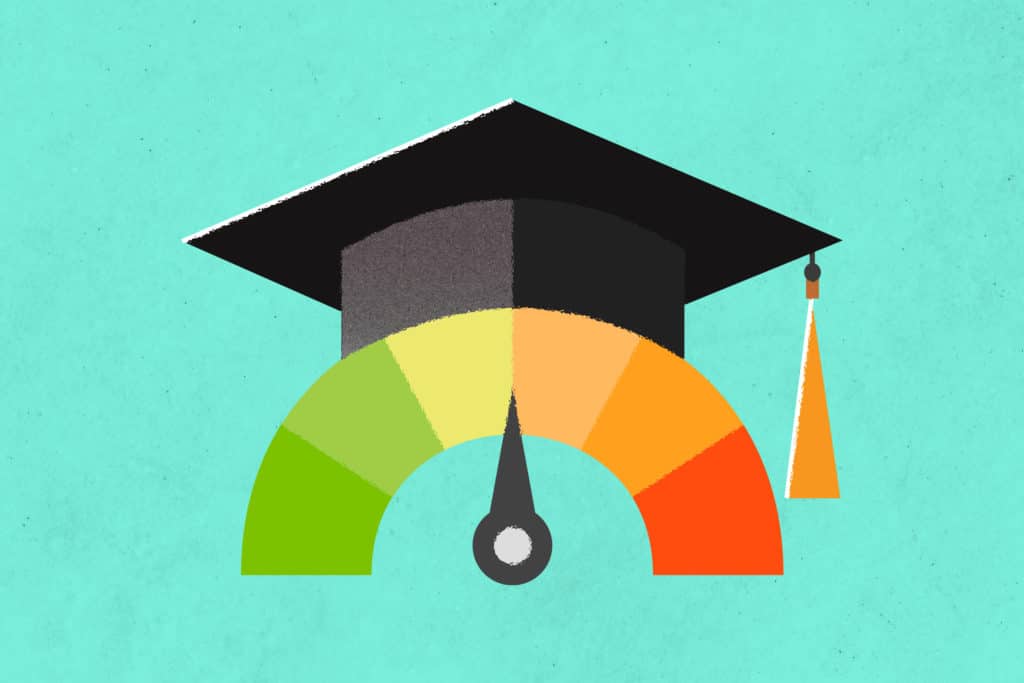Most people will need to take out student loans to pay for college. If you’re new to loans, applying for them can be an intimidating process. Different loans have different requirements, and you may feel unnerved by beginning the experience of adulthood by taking on tens of thousands of dollars of debt. So, if you have questions about the student loan process, such as what student loan credit scores you need to have your application accepted, make sure to read on.
What Credit Score Do You Need for a Federally Funded Student Loan?
There are two types of student loans: federal and private. Federal loans, which are student loans offered by the government, offer advantages and disadvantages to students.
Perhaps the greatest advantage is the lack of a credit check for most federal student loans. The government is aware that most new college students may not have a lengthy credit history, or, if they do, their assigned credit score may not be high enough to receive private financing.
The only real exception for the lack of credit checks is for PLUS loans. These student loans were created to provide aid for graduate students or the parents of undergraduates. While a credit check is required, there is no minimum score requirement.
However, negative marks in your credit history could come into play. So, if you have a bankruptcy or extreme delinquency on your report, your application may be declined. Yet, even then, there’s still some hope. Finding an endorser or cosigner can help reduce the risk of lending. Furthermore, you can write to the Department of Education to provide the details and context of your negative history.
What Credit Score Do You Need for a Private Student Loan?
One of the downsides of federal student loans is the cap placed on borrowing. This means, even if you successfully apply for a student loan from the government, you may still need a private loan to cover the entire cost of college.
Private loans, of course, offer no cap. However, they do require credit checks in almost all cases. So, those with poor or no credit history may find themselves unable to receive the financing they need. A cosigner can help, especially if their credit score offers a suitable balance to your less-than-stellar one.
Many private lenders are looking for credit scores of at least 620. Some may require a score as high as 660. However, a low credit score doesn’t completely diminish the odds of a private lender accepting your loan application. Around 42% of all private student loans went to students with scores of less than 660, including 17% of private loan holders with a score of less than 580.
Still, those with lesser credit scores may find themselves facing high interest rates that make it difficult to make headway on eventually paying down the loan’s principle. Those that find themselves in this situation may also benefit from a cosigner with a higher credit score.
How Can You Improve Your Score?
Besides a cosigner, who can improve your odds of a lender approving your application but won’t raise your credit score, there are a couple of different methods for improving your credit score. Before doing so, though, you should know what your score is and what’s being reported on your credit history. If you’re surprised by negative marks or the presence of specific loans, make sure to reach out to the credit agency that provided the report so you can gain more information or even file a dispute.
You should consider paying down any current debt you may have, too. Credit card debt is easy to rack up but difficult to pay off due to the typically high interest rates. Your credit usage rate also called your utilization rate, plays a major factor in determining your score. It’s calculated by dividing your total debt by the total amount of financing available to you. Paying down your debt will lower your utilization score, which should increase your credit score.
Some credit score considerations are more difficult to change on your own. The length of your credit history, a significant portion of your score, is impossible to adjust without being added to a long-established tradeline of someone else’s, for instance. Any positive changes you can impart into your credit score now will help establish a dependable financial foundation that grants you increased access to credit further down the road.
How Can Coast Tradelines Help?
When you take our online tradeline assessment we can help assess where your credits core needs improvement and how we can help. Purchasing a tradeline may help boost your credit score, putting you in range of a needed private student loan, but you should understand the common mistakes to avoid so you don’t end up buying too many tradelines or ones that won’t impact your score. Call us today at 613-363-1472 so our stellar service team can answer any questions you may have. Also, make sure to check out our blog for more information on understanding debt.


